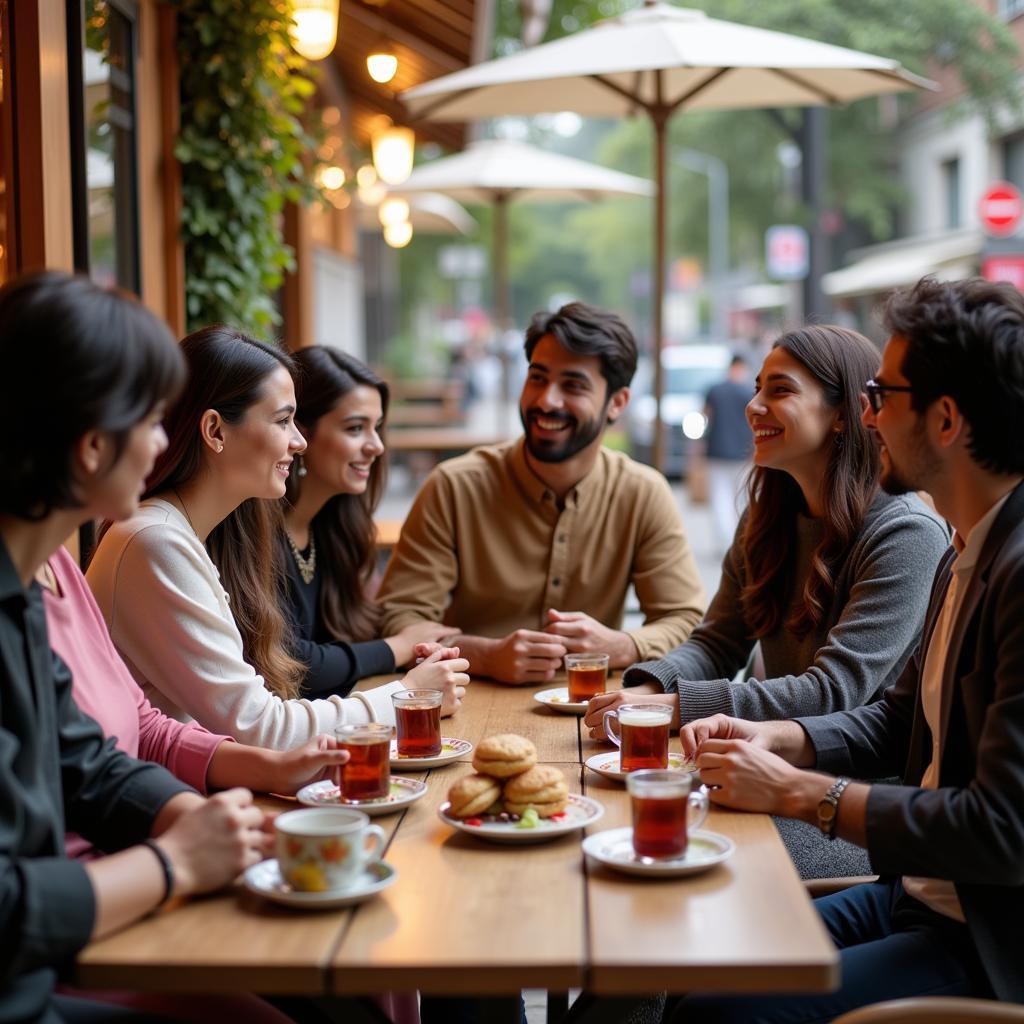Turkish tea, with its vibrant color and delicate flavor, has become a staple in Pakistani households. From bustling city cafes to quiet family gatherings, the clinking of tea glasses filled with this beloved beverage is a familiar sound. But how did this Turkish delight become so ingrained in Pakistani culture?
A Shared Love for Tea: A Bridge Between Cultures
Pakistan and Turkey share a history intertwined with cultural exchange, and tea plays a significant role in this bond. Both countries have a deep appreciation for tea, albeit with their own unique traditions. While Pakistan historically favored strong, milky chai, the introduction of Turkish tea offered a lighter, more aromatic alternative.
The rise in popularity of Turkish Tea In Pakistan can be attributed to several factors. Turkish dramas, gaining immense popularity in recent years, showcased the elegance of Turkish tea culture, sparking curiosity and desire. Simultaneously, the increasing availability of Turkish restaurants and cafes in Pakistan made experiencing authentic Turkish tea readily accessible.
What Makes Turkish Tea Unique?
Turkish tea distinguishes itself through its preparation and presentation. Brewed in a çaydanlık, a double-stacked teapot, the tea achieves a perfect balance of strength and flavor. Served in elegant tulip-shaped glasses, Turkish tea is not just a beverage but an experience. The clear glass allows for appreciation of the tea’s vibrant color, while the tulip shape helps retain heat and aroma.
Beyond the Beverage: The Social Significance of Turkish Tea
 Friends enjoying Turkish tea together
Friends enjoying Turkish tea together
Like in Turkey, Turkish tea in Pakistan transcends its role as a mere drink; it fosters social connection. Offered as a gesture of hospitality in homes and businesses, it serves as a catalyst for conversation, strengthening bonds and building relationships. The act of sharing a cup of Turkish tea, with its delicate aroma and comforting warmth, encourages a moment of pause, reflection, and connection.
The Allure of “Chai” with a Turkish Twist
The appeal of Turkish tea in Pakistan extends beyond its traditional form. Cafes and tea houses now offer a range of variations, blending Turkish tea with traditional Pakistani flavors. Apple tea, a popular choice, combines the delicate flavor of Turkish tea with the sweet, tart notes of apple, creating a refreshing and aromatic beverage.
The availability of Turkish delight, a sweet treat often enjoyed alongside Turkish tea, further enhances the experience. Turkish delight shops have popped up across major cities in Pakistan, offering a vibrant array of flavors and textures, further intertwining the culinary cultures of the two nations.
Conclusion: A Testament to Cultural Exchange
The embrace of Turkish tea in Pakistan is a testament to the power of cultural exchange. What began as a beverage enjoyed in Turkish homes is now a cherished part of Pakistani culture. The delicate flavor, elegant presentation, and social significance of Turkish tea have captured the hearts of Pakistanis, creating a lasting bond between the two nations. So next time you find yourself in Pakistan, be sure to partake in the cherished tradition of enjoying a cup of Turkish tea – a sip of culture, connection, and shared delight.
FAQs about Turkish Tea in Pakistan
1. Where can I find Turkish tea in Pakistan?
Turkish tea is widely available throughout Pakistan. You can find it in local cafes, restaurants, and even some supermarkets.
2. How is Turkish tea different from Pakistani chai?
Turkish tea is typically brewed without milk, resulting in a lighter, more aromatic beverage. Pakistani chai, on the other hand, is traditionally brewed with milk and spices, creating a richer, spicier flavor.
3. What is the best way to enjoy Turkish tea?
Turkish tea is best enjoyed in traditional tulip-shaped glasses, which help retain heat and enhance the aroma. It is typically served without milk or sugar, allowing the delicate flavors of the tea to shine through.
4. Is Turkish tea served with food in Pakistan?
While Turkish tea can be enjoyed on its own, it is often paired with sweet treats like Turkish delight, baklava, or traditional Pakistani sweets.
5. What is the significance of Turkish tea in Pakistani culture?
Like in Turkey, Turkish tea in Pakistan is more than just a beverage. It is a symbol of hospitality, friendship, and social connection. Sharing a cup of Turkish tea is a way to show respect, build relationships, and enjoy a moment of togetherness.
Need Help? Contact Us!
For any assistance or inquiries, feel free to reach out to us:
Phone Number: +923337849799
Email: [email protected]
Address: Dera Ghazi Khan Rd, Rakhni, Barkhan, Balochistan, Pakistan.
Our dedicated customer support team is available 24/7 to assist you.